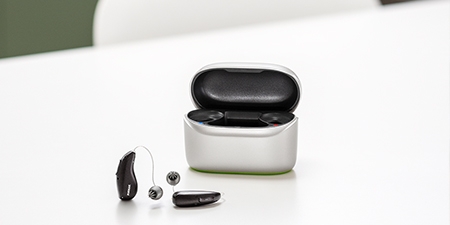How to Avoid Itching When Wearing Hearing Aid Domes

How to Avoid Itching When Wearing Hearing Aid Domes
15 min
Published April 30, 2025
Itchy ears can affect a handful of hearing aid users, from those working through the adjustment period of their first pair to others who've been enjoying better hearing for years and appear to have developed an irritation out of nowhere. The good news is that there are some tips on how to avoid itching when wearing hearing aid domes. The key to addressing it effectively is determining what's causing the itch. Let's explore the most common causes of itchy ears with hearing aids, remedies to address the issue, and practical tips to prevent it from happening again. If you need further help, contact an AudioNova location near you to schedule an appointment.
Hearing Aid Comfort and Design Considerations
Hearing aid styles vary in size and where they sit on the ear, which might affect experience and comfort. Behind-the-ear and receiver-in-canal aids have domes that sit in the ear canal, connecting to the receiver located outside the ear. Other styles don't have a connected dome but can still cause itchiness. Here's a quick overview of each kind of device:
- Behind-the-ear (BTE) - These hearing aids rest behind the ear, with tubing connecting to a custom-molded earpiece. While most of the device sits outside the ear, an improper fit of the mold or dome inside the ear can irritate.
- Receiver-in-Canal (RIC) - Similar to BTE designs, the receiver dome rests in the ear canal. Its smaller size can minimize irritation, but earwax buildup might still occur.
- Completely-in-Canal (CIC) - These are tiny hearing aids that fit deeply within the ear canal, featuring a design similar to that of earbuds. Their intimate placement can sometimes magnify issues with earwax or allergic reactions.
- Invisible-in-Canal (IIC) – These tiny devices sit in the ear canal, leaving no part of the device visible to anyone. They can pose the same type of irritation problems a CIC might cause.
Why Do Hearing Aids Make My Ears Itch?
The skin inside your ear canal is incredibly sensitive, and wearing hearing aids introduces a small but continuous presence in this delicate space. Something as minor as a stray hair can be enough to cause a slight tickle and itch. But that's not the only possible cause of hearing aid itch.
Allergic Reactions
High-quality hearing aids are crafted with medical-grade, hypoallergenic materials, such as silicone and acrylic, to minimize the risk of skin irritation and allergic reactions. However, even with medical-grade material, some people may be sensitive to them, causing red or itchy skin.
Trapped Moisture
Sweat, humidity, or water can accumulate inside the ear canal when wearing hearing aids, creating discomfort and itchiness. This is especially common for individuals living in warmer climates or those who wear their hearing aids while exercising.
Earwax Buildup
Hearing aids can stimulate an increase in earwax production, and when wax collects in the ear canal, it can irritate. It's essential to manage earwax safely to alleviate itching and prevent it from blocking the device's proper function.
Skin Irritation From Friction
If your hearing aid shell or dome doesn't fit properly, pressure and friction against the skin can lead to irritation and itching. This is one of many reasons why professionally fitted devices are so crucial for the best experience.
Ear Canal Infection
Bacterial or fungal infections, commonly known as "swimmer's ear," can occur when any amount of trapped moisture creates the ideal environment for microbes to grow.
Existing Skin Conditions
Chronic skin conditions such as eczema, psoriasis, or dermatitis can flare up when hearing aids come into contact with sensitive skin areas.
Improper Fit
Even high-quality hearing aids can cause discomfort if they aren’t professionally fitted. An improper fit can lead to issues such as pressure points and irritation, underscoring the importance of regular fittings and adjustments.
Hearing Aid Itch Relief Suggestions
If you're already experiencing itchy ears, consider the common reasons above to determine the cause. You might be able to address the issue safely at home and avoid a similar problem in the future. Try these methods, although some may require consulting a professional.
Keep Your Ears Clean
Use a soft, damp cloth to gently clean the outer ear and remove any debris or stray hairs. Avoid using cotton swabs or inserting objects into the ear canal, which can push wax deeper and cause further irritation.
Apply Approved Anti-Itch Creams
Some over-the-counter anti-itch creams, such as those containing hydrocortisone, can help reduce inflammation. Always consult your audiologist before using any product to ensure it is safe for use with your hearing aids.
Stay Hydrated
Drinking sufficient water can help keep your skin moisturized from the inside out. Proper hydration can reduce dryness and irritation in your ear canals.
Adjust Hearing Aid Usage
If itchiness becomes severe, consider taking short breaks from wearing your hearing aids to give your skin a chance to breathe and recover.
Consult Your Hearing Care Professional
With hearing aids from AudioNova, ongoing adjustments and fitting services are included with your purchase. Contact us to schedule an appointment, and we can inspect the device's fit, make necessary adjustments, and rule out potential issues such as infections or allergies. Don't have a hearing care provider? Contact us about getting started.
Get an Otoscope Exam
Our hearing care professionals use an otoscope exam to identify any underlying issues, such as excessive earwax, redness, or other visible causes of irritation that may be further down the canal. We use this information to offer more targeted advice or treatment.
Tips to Prevent Itchy Ears
Prevention is often more manageable— and more comfortable — than treating itchiness after it starts. Incorporate these tips into your daily routine to keep your ears itch-free:
- Clean Your Hearing Aids Regularly - Wipe your hearing aids with a clean, dry cloth daily to remove wax, moisture, and debris. This simple practice can go a long way toward preventing irritation.
- Thoroughly Dry Your Ears - After showering or swimming, ensure your ears are completely dry before inserting your hearing aids. Trapped moisture is one of the leading causes of irritation and infections.
- Insert Hearing Aids Properly - Be cautious when inserting your hearing aids to avoid unnecessary skin abrasion or pressure points. Proper placement can help prevent any discomfort.
- Use Hypoallergenic Skin Products - Applying a small amount of hypoallergenic moisturizer to the outer ear (not the inside of the ear canal) can help keep the skin hydrated and reduce irritation.
- Maintain Regular Check-Ups - Appointments and device maintenance with your hearing aid professional ensure your hearing aids remain well-fitted and comfortable. It's also a good time to inspect your ear health and address any issues before they become more severe.
- Consider Alternative Materials - If you suspect an allergic reaction to the materials of your hearing aid, discuss alternative options during your appointment. Modern hearing aids often come in multiple material types to better suit sensitive skin.
- Use a Dehumidifier for Your Hearing Aids - Store your hearing aids in a dehumidifier overnight to remove excess moisture from the devices. This prevents trapped moisture and ensures a fresh start for the next day.
- Limit Use During Intense Exercise - If possible, avoid wearing hearing aids during high-intensity activities that cause excessive sweating. If you need to wear them, wipe them down frequently during exercise.
- Manage Chronic Skin Conditions - If you have conditions like eczema or psoriasis, work with a healthcare provider to proactively manage flare-ups. Reducing inflammation in your skin makes it less likely to react to your hearing aids.
Need Assistance With Your Hearing Aids?
If you haven't had success with these tips and would like to speak with a professional about hearing aid itch relief, please contact an AudioNova location to schedule an appointment. Itchy ears shouldn't stand in the way of better hearing. Schedule an appointment, and we'll discuss solutions and the next steps.




